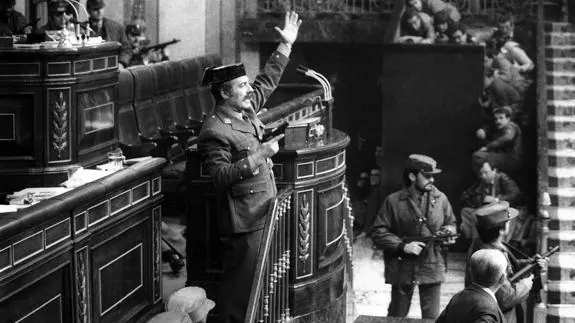23 February 1981: Antonio Tejero leads a coup d'état against Spain's government
The army officer was not satisfied with democratic politics and the Constitution of 1978
BEN CLARKE
Viernes, 23 de febrero 2018, 17:40
The events of 23 February 1981 still weigh heavily in the collective Spanish mind today, as a resurgence of strong-arm politics that posed a direct threat to the fledgling democracy in Spain that had only emerged following the death of the dictator Franco six years previously. The army, which had played a crucial part in government during Franco's military regime, was concerned about the shortcomings of democratic politics in solving some of the problems that Spain faced. Economic crisis in the country saw unemployment at 20 per cent and inflation at 16 per cent, there were difficulties in forming devolved governments for some of the Spanish regions, and the Basque terrorist group ETA was viewed as a growing threat.
In 1978, Antonio Tejero, who was originally from Alhaurín el Grande, and two co-conspirators plotted a coup for November of that year, codenamed Operation Galaxia, which would see an effort to prevent the establishment of Spanish democracy. Two military personnel informed their superiors of the plot, and soon all three were arrested. However, they were given the minimum sentences; Tejero served just seven months and did not lose his military rank.
On 10 February, Leopoldo Calvo Sotelo was named candidate for prime minister. Just three days later, a series of protests erupted in the Basque region after it became known that Jose Ignacio Arregui, a member of the terrorist movement ETA, had been tortured and killed. The revelations led to the dismissal of several police chiefs and resignations in the Interior Ministry. Meanwhile, Calvo Sotelo attempted to inaugurate his new government, but he failed to gain enough votes to be sworn in. A new vote was scheduled for 23 February.
Just after 6pm that day in the Congreso (lower house of parliament) in Madrid, the voting process for Calvo Sotelo was interrupted as 200 Guardia Civil officers armed with submachine guns, under the command of lieutenant colonel Antonio Tejero, burst into the parliament, shouting "¡Quieto todo el mundo!" ("Hold it everybody!"). Both the army general, Manuel Gutiérrez Mellado, and Adolfo Suárez attempted to reason with Tejero, who only shouted patriotic slogans.
The coup was condemned by members of the EEC, which Spain had applied to join, as well as UK Prime Minister Margaret Thatcher, who called it a "terrorist act."
Shortly afterwards, Jaime Milans del Bosch, an army Captain General supportive of Tejero, deployed 2,000 soliders and 50 tanks in Valencia.
In response, King Juan Carlos dressed as the highest rank in the military, Captain General of the Armed Forces, and publicly condemned the insurgents, highlighting the need to defend the new Spanish Constitution. It was then that it became clear that the coup had failed. Del Bosch's forces stood down at 5am. Tejero resisted until midday on 24 February, but was soon taken into custody by the authorities.
